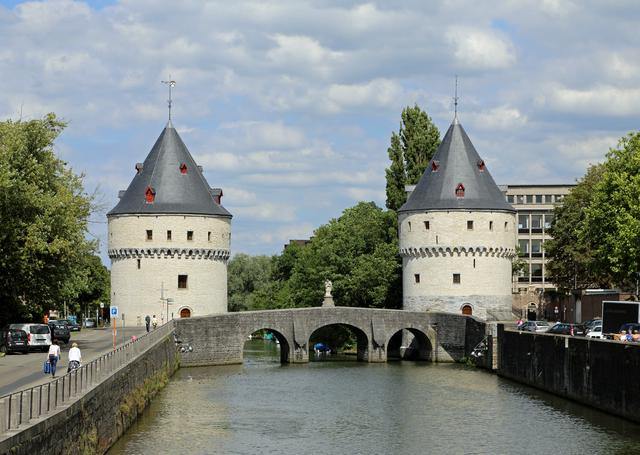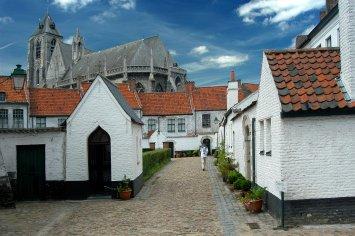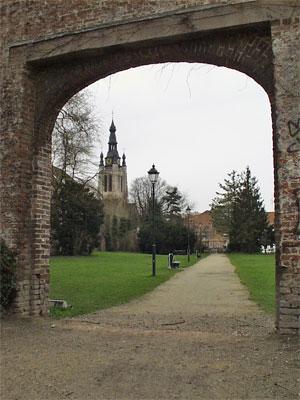 Kortrijk (French: Courtrai, sometimes referred to in English as Courtray) is a city in Flanders, the northern part of Belgium. It is the capital and biggest city of the arrondissement of Kortrijk, which has about 285,000 inhabitants (2014). The wider municipality comprises the city of Kortrijk proper and the towns of Aalbeke, Bellegem, Bissegem, Heule, Kooigem, Marke, and Rollegem.
Kortrijk (French: Courtrai, sometimes referred to in English as Courtray) is a city in Flanders, the northern part of Belgium. It is the capital and biggest city of the arrondissement of Kortrijk, which has about 285,000 inhabitants (2014). The wider municipality comprises the city of Kortrijk proper and the towns of Aalbeke, Bellegem, Bissegem, Heule, Kooigem, Marke, and Rollegem.
The city is on the Leie River, 42 km (26 miles) southwest of Ghent and 25 km (15 miles) northeast of Lille in France. Kortrijk and Lille are part of the same transnational Eurodistrict urban area with around 1,900,000 inhabitants.
As the biggest city of southern West Flanders, Kortrijk has many schools, a university, hospitals and shopping streets.
Kortrijk is a medium-sized city with a good balance of tradition and innovation/modernism. It has always been famous for shopping, and in 2010 a big shopping centre was opened in the heart of the city. There are traffic-free shopping zones, and lots of historical sites in the city centre. Outside the centre there are some less developed neighbourhoods, though none are really bad.
Kortrijk is a rather safe city. Suburbs/satellite cities like Menen have to endure mainly burglary criminality from youth and gangsters, but Kortrijk is rather safe.
The city is known as the Guldensporenstad (City of the Golden Spurs), after the battle of the Golden Spurs in 1302. It used to be the centre of the linen industry and is still known as an important textile industry region.
As Kortrijk is a part of Flanders, the main language is Dutch. Many of the inhabitants will be happy to answer you in English or if you ask beforehand, in French, although automatically starting a discussion in French could offend some of the locals. Some older people speak a little German.
- Kortrijk 1302, Begijnhofpark, +32 56 27 78 50. May-Sept: Tu-Su 10:00—18:00. Closed on Mondays. Oct-Apr: Tu-Su 10:00—18:00. Closed on Mondays. An interactive museum showing you the Battle of the Golden Spurs (11th of July 1302). This battle is historical because it was one of the first battles where a peasant-based army defeated a knights army. After the battle, the spurs of the fallen horses were kept as a victory sign. The battle gave Flanders its regional holiday. €6 normal ticket. €4 reduced ticket. Free for children up to 12.
- Broelmuseum. In an old 18th-century mansion. Mostly contains regional artists (f.i. Roelant Savery) and an unique collection of ceramic. Closed for renewal. Will open in 2018 with a different name and concept.
- Texture, Noordstraat 28, +32 56 27 74 70. May-Sept: Tu-Su 10:00—18:00. Closed on Mondays. Oct-Apr: Tu-Su 10:00—17:00. Closed on Mondays. New museum that opened in 2014 on the banks of the Lys (Leie) river. Shows a historical image of the flax industry in Kortrijk and the surroundings. €6 normal ticket. €4 reduced ticket. Free for children up to 12.
- Groeninge Abbey.
- Bakery and Mill Museum, Abijdmolenweg. 12 April—14 September: Sa Su 14:00—17:30. Housed in a 1841 brick mill in the village of Marke. In four steps you get to know the various aspects of the bakery sector. In addition you can look at various mill types and milling machines. €1 for adults, €0.50 for children up to 12. Younger than 6 go in for free.
- Agricultural Museum. In Bissegem.
Kortrijk 1302, Begijnhofpark, +32 56 27 78 50. May-Sept: Tu-Su 10:00—18:00. Closed on Mondays. Oct-Apr: Tu-Su 10:00—18:00. Closed on Mondays. An interactive museum showing you the Battle of the Golden Spurs (11th of July 1302). This battle is historical because it was one of the first battles where a peasant-based army defeated a knights army. After the battle, the spurs of the fallen horses were kept as a victory sign. The battle gave Flanders its regional holiday. €6 normal ticket. €4 reduced ticket. Free for children up to 12.
Broelmuseum. In an old 18th-century mansion. Mostly contains regional artists (f.i. Roelant Savery) and an unique collection of ceramic. Closed for renewal. Will open in 2018 with a different name and concept.
Texture, Noordstraat 28, +32 56 27 74 70. May-Sept: Tu-Su 10:00—18:00. Closed on Mondays. Oct-Apr: Tu-Su 10:00—17:00. Closed on Mondays. New museum that opened in 2014 on the banks of the Lys (Leie) river. Shows a historical image of the flax industry in Kortrijk and the surroundings. €6 normal ticket. €4 reduced ticket. Free for children up to 12.
Groeninge Abbey.
Bakery and Mill Museum, Abijdmolenweg. 12 April—14 September: Sa Su 14:00—17:30. Housed in a 1841 brick mill in the village of Marke. In four steps you get to know the various aspects of the bakery sector. In addition you can look at various mill types and milling machines. €1 for adults, €0.50 for children up to 12. Younger than 6 go in for free.
Agricultural Museum. In Bissegem.

- City Hall, +32 56 27 70 00.
- Belfry, Grote Markt.
- Begijnhof. The scenic beguinage (UNESCO-heritage) was founded in 1238 by Johanna Van Constantinopel. It was destroyed 3 times and rebuilt for the last time in the 17th century.
- Broeltorens. These two identical towers are remains of the medieval city wall. They are the typical image of Kortrijk. Build in the 13th and 15 century, they are on both sides of the Leie river.
- Onze-Lieve-Vrouwehospitaal. Hospital, founded between 1200 and 1204.
- Baggaertshof. Medical garden and 13 old houses.
- Groeningepoort and Groeningekouter, Plein. The Groeningepoort gate is built in 1908 to commemorate the 600th anniversary of the Golden Spurs battle on the location of the Groeningekouter, the field of the battle took place. In the park that now covers a part of the former battle field, you can also find the Groeningemonument.
- Schouwburg, Schouwburgplein 14, +32 56 23 98 55. A rather impressive, chateau-like building. Schouwburg is the Dutch word for theatre.
- The Wave Fountain, Schouwburgplein (Near the theatre. Made by Olivier Strebelle.
City Hall, +32 56 27 70 00.
Belfry, Grote Markt.
Begijnhof. The scenic beguinage ([[UNESCO]]-heritage) was founded in 1238 by Johanna Van Constantinopel. It was destroyed 3 times and rebuilt for the last time in the 17th century.
Broeltorens. These two identical towers are remains of the medieval city wall. They are the typical image of Kortrijk. Build in the 13th and 15 century, they are on both sides of the Leie river.
Onze-Lieve-Vrouwehospitaal. Hospital, founded between 1200 and 1204.
Baggaertshof. Medical garden and 13 old houses.
Groeningepoort and Groeningekouter, Plein. The Groeningepoort gate is built in 1908 to commemorate the 600th anniversary of the Golden Spurs battle on the location of the Groeningekouter, the field of the battle took place. In the park that now covers a part of the former battle field, you can also find the Groeningemonument.
Schouwburg, Schouwburgplein 14, +32 56 23 98 55. A rather impressive, chateau-like building. Schouwburg is the Dutch word for theatre.
The Wave Fountain, Schouwburgplein (Near the theatre. Made by Olivier Strebelle.
- Sint-Maartenskerk, Lange Steenstraat. A Gothic church, built and rebuilt after a fire in the 14th century.
- Onze-Lieve-Vrouwekerk, Deken Zegerplein.
- Sint-Michielskerk, Sint-Michielsplein.
- Sint-Elooiskerk, Overleiestraat.
- Sint-Jan-de-Doperkerk, Sint-Jansplein.
Sint-Maartenskerk, Lange Steenstraat. A Gothic church, built and rebuilt after a fire in the 14th century.
Onze-Lieve-Vrouwekerk, Deken Zegerplein.
Sint-Michielskerk, Sint-Michielsplein.
Sint-Elooiskerk, Overleiestraat.
Sint-Jan-de-Doperkerk, Sint-Jansplein.

- Wilde Westen, Conservatoriumplein 1, +32 56 37 06 44. Main cultural center of the city. Frequent concerts of usually rather unknown local singers and bands.
- Kortrijk Xpo, Doorniksesteenweg 216, +32 56 24 11 11. This is the main exhibition centre of the region and from time to time hosts fairs that can attract a big crowd.
Wilde Westen, Conservatoriumplein 1, +32 56 37 06 44. Main cultural center of the city. Frequent concerts of usually rather unknown local singers and bands.
Kortrijk Xpo, Doorniksesteenweg 216, +32 56 24 11 11. This is the main exhibition centre of the region and from time to time hosts fairs that can attract a big crowd.
Kortrijk offers one of the biggest car free areas in Belgium where one can shop or have drink on a nice terrace. One of these streets, the Korte Steenstraat, was the very first pedestrian street in Belgium.
- K in Kortrijk. Closed on Su. In the heart of the pedestrian area, a large covered shopping centre, named K in Kortrijk, opened in 2010. This shopping mall makes the pedestrian link between the Lange Steenstraat and the Veemarkt-square and offers some 90 large stores.
K in Kortrijk. Closed on Su. In the heart of the pedestrian area, a large covered shopping centre, named K in Kortrijk, opened in 2010. This shopping mall makes the pedestrian link between the Lange Steenstraat and the Veemarkt-square and offers some 90 large stores.
- Paul's Boutique, +32 475 49 71 75. 10:00—20:00, on Saturdays until 19:00. Closed on Sundays. Eat-in and take-away burger bar with surprising and tasty combinations - includes a lot of vegetarian options. Standard burger costs €8.
- Nectar, Sint-Jansstraat 17, +32 56 22 79 69. M-F 12:00—14:00. Vegetarian restaurant near the K shopping centre. Only open during lunch time on weekdays.
- Vesper, Voorstraat 34, +32 56 90 30 98. Budget restaurant with tasty dishes.
Paul's Boutique, +32 475 49 71 75. 10:00—20:00, on Saturdays until 19:00. Closed on Sundays. Eat-in and take-away burger bar with surprising and tasty combinations - includes a lot of vegetarian options. Standard burger costs €8.
Nectar, Sint-Jansstraat 17, +32 56 22 79 69. M-F 12:00—14:00. Vegetarian restaurant near the K shopping centre. Only open during lunch time on weekdays.
Vesper, Voorstraat 34, +32 56 90 30 98. Budget restaurant with tasty dishes.
- De Vlasblomme, Etienne Sabbelaan 11, +32 56 21 60 32. Su-F 10:00—22:00, Sa 10:00—23:00. Closed on Sunday. Traditional Flemish food. Outside the city centre.
- Sint-Medard, Deken Zegerplein 1, +32 56 44 02 23. Closed on Tu. Restaurant with Belgian dishes.
De Vlasblomme, Etienne Sabbelaan 11, +32 56 21 60 32. Su-F 10:00—22:00, Sa 10:00—23:00. Closed on Sunday. Traditional Flemish food. Outside the city centre.
Sint-Medard, Deken Zegerplein 1, +32 56 44 02 23. Closed on Tu. Restaurant with Belgian dishes.
- Va Et Vient, Handboogstraat 20 (Close to the Broeltorens, +32 56 20 45 17. Closed on Su and M. Delicious dishes in a stylish setting. This restaurant is one of Kortrijk's most cherished ones.
Va Et Vient, Handboogstraat 20 (Close to the Broeltorens, +32 56 20 45 17. Closed on Su and M. Delicious dishes in a stylish setting. This restaurant is one of Kortrijk's most cherished ones.
- The typical place to party is the end of the Burgemeester Reynaertstraat close to the station. By the local public this is called 'Het Straatje', which stands for 'the little street'. This is a typical place for going out on Thursday night and in the weekend. There are around seven bars, which typical have loud music and are for dancing.
- If you're keen to enjoy a quiet drink, a place to go is the Vlasmarkt, on a minute walk from The Belfry. A handful of bars there are very nice designed and enjoyable to visit, and usually, they are less expensive then the bars on the Market Place. This place is frequented by locals.
- Den Bras, Stationsplein 6, +32 56 20 49 03. Closed on Su. Perfect place to go during daytime.
- Den Trap, Burgemeester Reynaertstraat 19. Closed on Su. The little brother of Den Bras, located in the cellar. Den Trap is a bar with high rock and roll appeal, and sometimes during the week you can enjoy a free concert here from very promising bands in the area.
- deDingen, Budastraat 12, +32 56 90 72 57. M closed. Cozy little place to have a small drink and play board games. Homely atmosphere, and they have a cat walking around. In one of the rooms is a piano you can play on. Also small snacks are available.
- the Pit's, Sint-Rochuslaan 1. 19:30 - .... The Pit's, the concertplace of vzw Bang Zoom Noise Produktions (BZN), started in december 1988. Kortrijk had in the 1980s some places where "alternative", "non-conformist" music could play. For various reasons those places stopped doing that and some locals decided it was their time to set things up. After 27 years more than 2000 bands have played; most part in The Pit's and some on other stages under various co-organisations. This is rather a huge achievement for a completely volunteer run organisation. Among the bands who played are: Drive Like Jehu, GO!, Crowbar, Eyehate God, Rancid, Nations on Fire, The Mummies, Antiseen, New Bomb Turks,Supersnazz, the Spits, the Locust, Dead Moon, Groovie Ghoulies, Killdozer, Deadbolt, D.O.A., Strychnine, Zeno Tornado.... Nowadays it's run by some arrogant prick with a beard but still worth it! 0-€7.
The typical place to party is the end of the Burgemeester Reynaertstraat close to the station. By the local public this is called 'Het Straatje', which stands for 'the little street'. This is a typical place for going out on Thursday night and in the weekend. There are around seven bars, which typical have loud music and are for dancing.
If you're keen to enjoy a quiet drink, a place to go is the Vlasmarkt, on a minute walk from The Belfry. A handful of bars there are very nice designed and enjoyable to visit, and usually, they are less expensive then the bars on the Market Place. This place is frequented by locals.
Den Bras, Stationsplein 6, +32 56 20 49 03. Closed on Su. Perfect place to go during daytime.
Den Trap, Burgemeester Reynaertstraat 19. Closed on Su. The little brother of Den Bras, located in the cellar. Den Trap is a bar with high rock and roll appeal, and sometimes during the week you can enjoy a free concert here from very promising bands in the area.
deDingen, Budastraat 12, +32 56 90 72 57. M closed. Cozy little place to have a small drink and play board games. Homely atmosphere, and they have a cat walking around. In one of the rooms is a piano you can play on. Also small snacks are available.
the Pit's, Sint-Rochuslaan 1. 19:30 - .... The Pit's, the concertplace of vzw Bang Zoom Noise Produktions (BZN), started in december 1988. Kortrijk had in the 1980s some places where "alternative", "non-conformist" music could play. For various reasons those places stopped doing that and some locals decided it was their time to set things up. After 27 years more than 2000 bands have played; most part in The Pit's and some on other stages under various co-organisations. This is rather a huge achievement for a completely volunteer run organisation. Among the bands who played are: Drive Like Jehu, GO!, Crowbar, Eyehate God, Rancid, Nations on Fire, The Mummies, Antiseen, New Bomb Turks,Supersnazz, the Spits, the Locust, Dead Moon, Groovie Ghoulies, Killdozer, Deadbolt, D.O.A., Strychnine, Zeno Tornado.... Nowadays it's run by some arrogant prick with a beard but still worth it! 0-€7.
Internet reception over the whole city is very good, as major networks cover the area. Also almost all hotels and a lot of bars and pubs offer you free internet.
- Generally safe, small unsafe areas near the station (at night) and the Venning, a local neighbourhood.
- The local police station is at the end of the street in front of the train station(Next to Domino's Pizza). Most of the police officers speak fluently Dutch/English/French.
- Small crimes (vandalism) or information (directions) can easily be reported/asked at some of the city's "guards", who just walk around dressed in purple.
Kortrijk is on the "Vlaanderen Fietsroute", a cycling network through Flanders, a network of 800 km guiding you through Flanders nicest spots by bike.
- Brussels — Belgian and European capital.
- Antwerp — a large and active harbor city, famous for its fashion and diamonds.
- Ghent — An important and vibrant university city with beautiful architecture, often overlooked by tourists who visit Brugge or Brussels.
- Bruges — The famous capital of West-Flanders. The entire city centre is Unesco Heritage. Often called: "Venice of the north", due to the many canals and scenic centre.
- Ypres — Pretty town famous for World War I battles.
- Lille — French big city with Flemish roots, forms a metropolitan area with Kortrijk.
- Tournai (Dutch: Doornik) — only 30-35 minutes away by train in French-speaking Wallonia.
